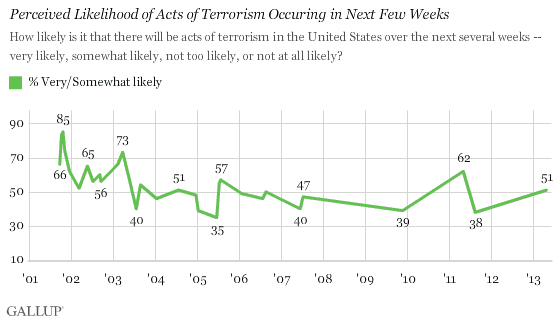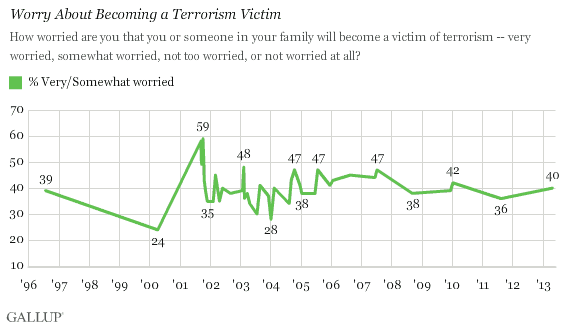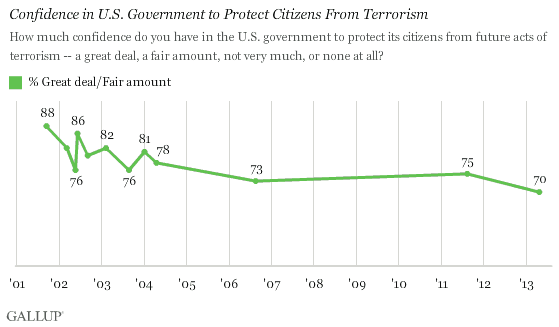PRINCETON, NJ -- Less than two weeks after the Boston Marathon bombings killed three onlookers, wounded nearly two hundred, and closed the streets of Boston and its environs during an intense manhunt for the suspects, half of Americans believe a terrorist attack in the U.S. could be imminent. That is up from 38% in August 2011, and is one of the higher readings Gallup has recorded in recent years.

More specifically, 12% of Americans Gallup surveyed April 24-25 think it is very likely that a terrorist attack will occur in the next several weeks, and 39% call this somewhat likely. Another 34% consider it not too likely, while 12% say it is not at all likely.
The year-and-a-half time span between Gallup's current reading and the prior one in 2011 makes it impossible to definitely ascribe the increase to the April 15 Boston Marathon bombings. However, given how Americans have reacted to terrorism in the past, a connection is likely. Also, the current reading is clearly above the average 47% who have believed a terrorist attack is imminent in polling since the U.S. officially toppled Saddam Hussein's regime during the Iraq war. Prior to that point -- spanning the post-9/11 period and the early phase of the Iraq war -- 67% of Americans, on average, said they thought a terrorist attack in the U.S. was very or somewhat likely.
The only other recent instance when public anticipation of an imminent terrorist act surged was in May 2011. That clearly reflected Americans' concern about retaliation the day after the U.S. killed al Qaeda leader Osama bin Laden at his hiding place in Pakistan.
Despite Americans' elevated concern that a terrorist event could soon occur, the percentage worried that they or a family member could be a terrorism victim is up only slightly, to 40% from 36% in August 2011. However, that is in line with the 36% to 42% range Gallup has recorded on this measure since 2008, and well below the heights of concern recorded in the immediate post-9/11 and Iraq war period.

Faith in Government to Protect Against Terrorism Dips
The same poll shows 70% of Americans feeling confident in the federal government to protect its citizens from future acts of terrorism, including 19% who have a great deal of confidence in it and 51% a fair amount. About three in 10 have low confidence, including 21% who say "not very much," and 8% who say "none at all."
While high in absolute terms, the 70% who are generally confident in the U.S. government on terrorism is slightly lower than the 75% found in 2011, although not significantly different from the 73% measured in 2006, when George W. Bush was president.

Bottom Line
About half of Americans perceive that a terrorist act in the U.S. is at least fairly likely to occur in the coming weeks. This is significantly higher than the 38% anticipating a terrorist attack when Gallup last measured this in August 2011 during the relatively quiet news environment leading up to the 10-year anniversary of the 9/11 attacks. The current reading likely reflects public anxiety stemming from the Boston Marathon bombings, as well as possibly the news about ricin-laced letters to the president and lawmakers that were intercepted last week in Washington, D.C.
At the same time, there has been a much smaller jump in Americans' personal fear of becoming a terrorism victim, rising just four percentage points to 40%. Twelve years after fear spiked to 59% after the 9/11 attacks, Americans may be growing more accustomed to the threat of terrorism, and less likely to be personally rattled by it.
While most Americans continue to express a significant amount of confidence in the federal government to protect Americans from terrorism, their trust has fallen to 70%, possibly reflecting media speculation about whether federal agencies may have overlooked important intelligence information in their failure to track the Boston perpetrators more closely. How that review plays out could strongly influence Americans' future confidence in the government to protect them from terrorism.
Survey Methods
Results for this Gallup poll are based on telephone interviews conducted April 24-25, 2013, on the Gallup Daily tracking survey, with a random sample of 1,023 adults, aged 18 and older, living in all 50 U.S. states and the District of Columbia.
For results based on the total sample of national adults, one can say with 95% confidence that the maximum margin of sampling error is ±4 percentage points.
Interviews are conducted with respondents on landline telephones and cellular phones, with interviews conducted in Spanish for respondents who are primarily Spanish-speaking. Each sample of national adults includes a minimum quota of 50% cellphone respondents and 50% landline respondents, with additional minimum quotas by region. Landline telephone numbers are chosen at random among listed telephone numbers. Cellphone numbers are selected using random digit dial methods. Landline respondents are chosen at random within each household on the basis of which member had the most recent birthday.
Samples are weighted to correct for unequal selection probability, nonresponse, and double coverage of landline and cell users in the two sampling frames. They are also weighted to match the national demographics of gender, age, race, Hispanic ethnicity, education, region, population density, and phone status (cellphone only/landline only/both, cellphone mostly, and having an unlisted landline number). Demographic weighting targets are based on the March 2012 Current Population Survey figures for the aged 18 and older U.S. population. Phone status targets are based on the July-December 2011 National Health Interview Survey. Population density targets are based on the 2010 census. All reported margins of sampling error include the computed design effects for weighting.
In addition to sampling error, question wording and practical difficulties in conducting surveys can introduce error or bias into the findings of public opinion polls.
View methodology, full question results, and trend data.
For more details on Gallup's polling methodology, visit www.gallup.com.
